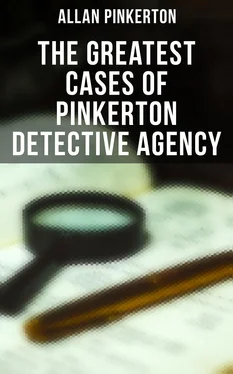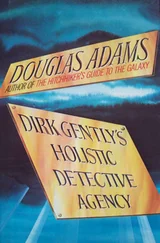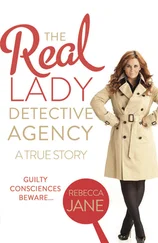In the morning, as he was walking along the street, in a very penitential mood, he was accosted by his friend, who demanded of him the one hundred dollars he had borrowed. Simon put on a very important air, and in a tone of confidence which he was far from feeling, assured him he should have the money before he left town.
As Simon strolled along, puzzling his brain as to how he could raise the necessary funds to pay off his friend, he saw the tall, ungainly form of a backwoods planter shuffling down the street towards him.
The planter was dressed in a suit of butternut, which had become very much shrunken, from exposure to all kinds of weather. His coat sleeves did not reach far below his elbows, and there was a considerable space between the bottom of his breeches and the top of his shoes. He was as "thin as a rail," and if he stood upright would have been very tall, but he was bent nearly double. He had a slouched hat on, which partly concealed his long, lantern-jawed visage, while his shaggy, uncombed hair fell to his shoulders, and gave one a feeling that it contained many an inhabitant, like that which caused Burns to write those famous lines containing the passage:
"Oh, wad some power the giftie gie us,
To see oursels as ithers see us!"
As he came down the street he stopped occasionally and gawked around.
Simon was always ready for fun, and determined to see what the planter was up to. Accordingly, as they met, Simon said, "Good mornin'!"
"Good mornin'!" replied the gawky.
"Have yer lost summat?" asked Simon.
"Wal, no, stranger, but I wants to git some money changed, and I'll be durned if I can diskiver a bank in this yar village."
"Bin sellin' niggers, eh?"
"You're out thar," replied the planter. "I've bin sellin' cotton."
"I'm jist the man to help yer! I'm gwine to my bank. Gin me yer money, and come along with me and I'll change it for yer!"
The gawky was much pleased at Simon's kind attention, and remarking that "he reckoned he was the squarest man he had met," he turned over his money—some four hundred dollars—to Simon, and they started off together to get it changed.
On the road Simon stepped into a saloon with the planter, called up all the inmates to take a drink, and telling the planter he would be back with the money in a few minutes, started off.
Fifteen minutes passed away. The planter took several drinks, and began to think his friend was a long time in getting the money changed, but supposed he must be detained at the bank. At the end of half an hour he began to grow decidedly uneasy, but still Simon did not come. At the expiration of an hour he was furious, and if Simon had fallen into his hands at that time, he would have doubtless been made mince meat of unceremoniously.
Simon, on leaving the saloon, had gone to his friend and, out of the poor planter's funds, had paid him the hundred dollars he owed him, and, with the three hundred dollars in his pocket, started for Patterson's.
He proceeded to "buck the tiger," and soon lost nearly all of it. To see if his luck would not change, he gave up the game, and started at "roulette." Here he steadily won, and soon had over seven hundred dollars in his possession. He was now all excitement, and jumped with many a "whoop-la" around the table, to the great amusement of the spectators. He was about to give up play, but they urged him on, saying he had a run of luck, and should not give up till he broke the bank. Thus encouraged, he played for heavy stakes, and was soon completely "cleaned out," and left Patterson's without a cent.
He went to a friend and borrowed twenty-five dollars to help him out of town. He was considered good for a small short loan; and going to his hotel, he paid his bill, and mounting his dilapidated steed, started for his home, forty miles distant, at as great a speed as he could get out of his poor "Rosinante." In the South, men, women and children, always make short journeys on horseback. Simon travelled for two hours, when he reached the Coosa river, about fifteen miles from Montgomery. At this point lived a wealthy widow, with whom he was well acquainted, and here he determined to pass the night. He was joyfully welcomed by the widow, who ordered one of her negroes to put up his horse and conducted him into the house. She had a good supper prepared, Simon ate a hearty meal, spent a few delightful hours in the widow's company, and was then shown to his room. He was soon in the arms of Morpheus, and arose in the morning as gay as a lark. Throwing open the casement, he let in the fresh morning breeze and took in at a glance the rich Southern landscape. Immediately below him, and sloping in well kept terraces to the banks of the Coosa, was a trim garden, filled with flowers, among which, in fine bloom, were numerous varieties of the rose. The sluggish waters of the Coosa flowed without a ripple between its well wooded banks, the trees on opposite sides often interlocking their branches. Beyond the river was a wilderness of forest; the slaves were going to their labor in the cotton fields, singing and chatting gaily like a party of children. It was indeed a beautiful scene, and who could more thoroughly appreciate the beautiful than Simon? Hurriedly dressing himself, he went to the breakfast room, where he found waiting for him the buxom widow, dressed in a loose morning robe, admirably adapted to display the charms of her figure.
After a delicious repast of coffee and fruit the widow proposed that as it was such a lovely morning they take a boat-ride on the river. Simon willingly acquiesced, and the widow, after ordering a well filled lunch-basket to be placed in the boat, not forgetting a "little brown jug" for Simon, took his arm, and tripping gaily down to the river, embarked. Simon pulled strongly at the oars until a bend of the river hid them from view of the plantation, when, taking in the oars, he seated himself by the widow, and placing an oar at the stern to steer with, they glided down the river. Simon was married, but was a firm believer in the theory advanced by Moore, that
—"when far from the lips we love,
We've but to make love to the lips we are near."
The persimmons hung in tempting bunches within easy reach overhead, and Simon would pull them down and shower them into the widow's lap. Occasionally he would steal his arm around her waist, when she, with a coy laugh, would pronounce him an "impudent fellow." Occasionally he would raise the little brown jug and take a hearty pull; finally he stole a few kisses, the widow dropped her head resignedly on his shoulder, and so they floated down the current, loving "not wisely, but too well." On and on they floated, entirely oblivious of time, when they were suddenly startled by a wild halloo. The widow started up with a scream, and Simon grasped the oars as soon as possible. Just in front of them, seated on his horse, and with his revolver ready cocked in his hand, sat the deputy sheriff of Montgomery. "Simon Suggs," said he, "jist you git out of that thar boat and come along with me; I've got a warrant for your arrest!"
"Oh! hav yer?" said Simon, "that's all right; I'll jist take this yar lady hum, git my critter, and come in to Montgomery."
"No," said the inexorable deputy, "that won't do, jist you git out of that thar boat and come with me."
The widow now interposed, and in plaintive tone said, "But, sir, what am I to do? It will never do for me to return without Mr. Suggs; what will my niggers think of it? You, Mr. Deputy, can get into the boat with us and go to my house; while you are eating dinner I will send one of my niggers to fetch your horse."
The deputy was finally persuaded to take this course, and securing his horse, he got into the boat.
It will now be necessary to relate how the deputy happened to appear at such an inopportune moment for Simon. The planter, after awaiting the return of Simon for over two hours, was informed by the saloon keeper to whom he appealed, that he had entrusted his money to Simon Suggs, and that his chances of ever seeing it again were poor indeed. On discovering this he swore out a warrant against Simon and placed it in the hands of the sheriff to execute.
Читать дальше












